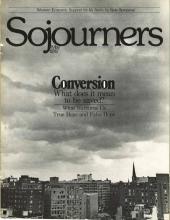And now I am coming to thee; but while I am still in the world I speak these words, so that they may have my joy within them in full measure. I have delivered thy word to them, and the world hates them because they are strangers in the world, as I am. I pray thee, not to take them out of the world, but to keep them from the evil one. They are strangers in the world, as I am. Consecrate them by the truth; thy word is truth. As thou hast sent me into the world, I have sent them into the world, and for their sake I now consecrate myself, that they too may be consecrated by the truth.
But it is not for these alone that I pray, but for those also who through their words put their faith in me; may they all be one: as thou, Father, art in me, and I in thee, so also may they be in us, that the world may believe that thou didst send me. The glory which thou gavest me I have given to them, that they may be one, as we are one; I in them and thou in me, may they be perfectly one. Then the world will learn that thou didst send me, that thou didst love them as thou didst me (John 17:13-23).
Jesus here prays for his disciples and for all those who would come after them. He knows that they will be in conflict with the world. He knows this because his own life, his words, his kingdom were in such conflict with the world, and now his life is in them, his words have been received by them, and the message of his kingdom has been entrusted to them.
The world will hate them just as it hated him. The world will treat them as they have treated him because they, like him, will not be of the world, will not belong to the world, but will live as strangers in it, just as he did.
Read the Full Article

Already a subscriber? Login
